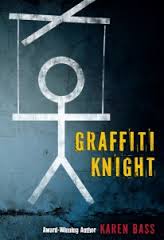
Graffiti Knight
Written by Karen Bass
Pajama Press, 2014, 287 pp.
ISBN: 9781927485538
I know about Soviet justice. My father is experiencing it in one of their prison camps,” Karl whispered and turned his attention to the water. “You’d better hope you don’t get it. (p. 59)
Wilm is 16 years old, living in Soviet-controlled southeast Germany right after World War II. He watches the injustice around him as the German police become puppets for the Soviet soldiers who brutalize the citizens of Leipzig. His father is angry, his mother cautious, and his sister has become a shadow of herself. Wilm decides that he can no longer sit by while his city, his family, and his friends remain under siege. He plasters political messages around the city center, most often on government buildings, in protest against the cruelty and oppression he can no longer tolerate. His two best friends begin the work with him, but as Wilm becomes more and more daring, his friends worry that Wilm will get caught, or worse yet, endanger those around him. Either option could be deadly for those involved or for those who are related to him.
A well-told story with a dynamic protagonist, an edge-of-your-seat plot, and a satisfying outcome, Graffiti Knight is a great example of how the aftermath of war can be as harrowing as war itself, especially for vulnerable populations—women, the disabled, or those under control of outsiders. Wilm aptly portrays how young people have a role to play in the defense of their own and others’ rights as citizens on their native soil even as they are treated as the conquered. This theme is especially timely and thought-provoking as this type of situation is currently being played out across the world. Adolescent readers will have much to ponder in response to Wilm’s behavior, but in many ways, he is the hero of his own life. Additionally, he becomes a hero to others who were too frightened to strike out against the German police who seem willing to collaborate with the Soviets. In many ways, this story reflects the situation experienced by the Jewish population as the Nazis took control of Europe, which could widen the discussion to addressing how conquering forces that have political domination set up circumstances that often result in further violence and human upheaval.
This narrative would make a great companion to books such as My Cousin’s Keeper (Simon French, 2014) which moves from the protagonist collaborating with bullies to standing up against them, or stories such as Moon at Nine (Deborah Ellis, 2014) and The Declaration (Gemma Malley, 2011), which also show teens defying systems in defense of their own rights. An intriguing story that will have readers addressing the way in which young people can be forces in their worlds, Graffiti Knight presents a young man who stumbles like many adolescents, yet ultimately grows into his own and provides the leadership so often difficult but necessary to make change.
Karen Bass currently lives in Hythe, Alberta, Canada. Graffiti Knight is her fourth book published for young adults and has been nominated for the 2014 Geoffrey Bilson Award for Historical Fiction for Young People and won the Canadian Literature Award (for chapter books) for 2014. More information about Bass can be found on her website.
This book was named a 2015 Outstanding International Book by USBBY.
Holly Johnson, University of Cincinnati, Ohio
WOW Review, Volume VII, Issue 3 by Worlds of Words is licensed under a Creative Commons Attribution-NonCommercial-ShareAlike 4.0 International License. Based on work at https://wowlit.org/on-line-publications/review/vii-3/
